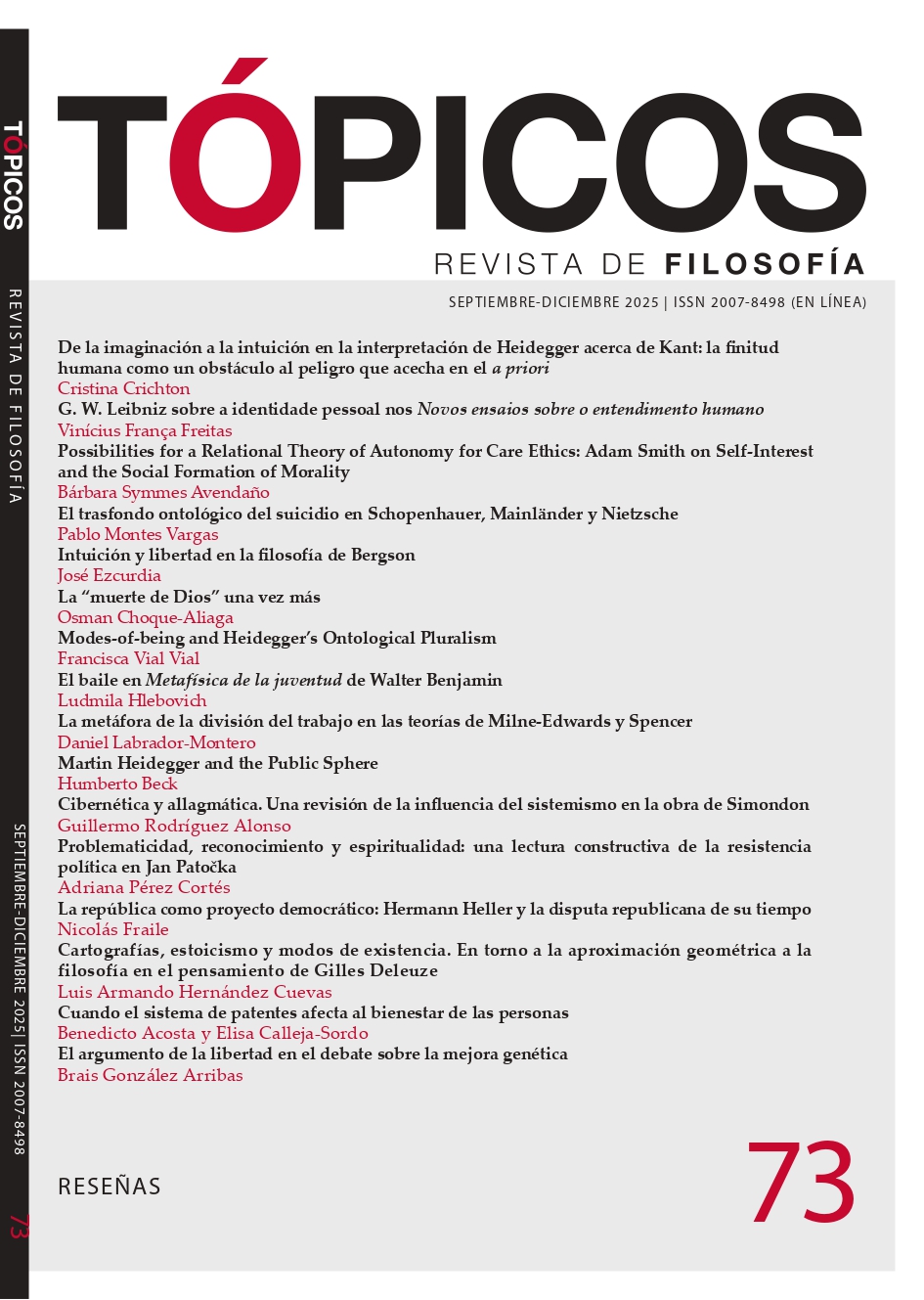From Imagination to Intuition in Heidegger’s Interpretation of Kant: Human Finitude as an Obstacle to the Danger Lurking in the A Priori
Published 2025-07-14
Keywords
- Heidegger,
- Kant,
- intuition,
- imagination,
- a priori
- finitude,
- creation,
- existence,
- representation,
- experience ...More
Copyright (c) 2025 Tópicos, Revista de Filosofía

This work is licensed under a Creative Commons Attribution-NonCommercial-NoDerivatives 4.0 International License.
How to Cite
Abstract
In his text Die Frage nach dem Ding, Heidegger offers an analysis of Kant’s thought that highlights the role of sensible intuition. This constitutes a shift in focus from his interpretation in Kant und das Problem der Metaphysik, where transcendental imagination is the center of attention. In this paper, I provide an analysis of the reason for this change, suggesting that it is linked to an intensification of Heidegger’s concern for human finitude in relation to the notion of “creation”, which in turn responds to the fact that, by the mid-1930s, Heidegger realizes that thinking of being as the a priori carries a danger. This lies in the fact that being thus thought can detach itself from what is given in everyday experience and become determined by pure reason alone, thus turning into a representation against experience, characteristic of modern scientific thinking and whose ultimate aspiration is the creation of existence.
References
- Barton, W. B. (1973). An Introduction to Heidegger’s What is a Thing? Southern Journal of Philosophy, 11(1)(2), 15-25. https://doi.org/10.1111/j.2041-6962.1973.tb01116.x
- Carr, D. (2007). Heidegger on Kant and Transcendence. En S. Crowell y J. Malpas (eds.), Transcendental Heidegger (pp. 28-42). Stanford University Press. https://doi.org/10.1515/9780804768191-004
- Crichton, C. (2019). Heidegger on Representation: The Danger Lurking in the A Priori. Tópicos, Revista de Filosofía, 56, 167-195. https://doi.org/10.21555/top.v0i56.1032
- Crichton, C. (2020). Thought in the Service of Intuition: Heidegger’s appropriation of Kant’s Synthetic A Priori in Die Frage nach dem Ding. Kriterion. Revista de Filosofía, 61(146), 339-361. https://doi.org/10.1590/0100-512x2020n14604cc
- Crichton, C. (2022). Metontology and Heidegger’s Concern for the Ontic after Being and Time: Challenging the A Priori. Trans/Form/Ação, 45(3), 33-58. https://doi.org/10.1590/0101-3173.2022.v45n3.p33
- Crichton, C. (en prensa). El “arte de existir”: intuición y singularidad. Aportes a la dimensión ética del pensar de Heidegger a la luz de su “metontología”. Revista de Humanidades UNAB, 52.
- Dahlstrom, D. (2007). Transcendental Truth and the Truth that Prevails. En S. Crowell y J. Malpas (eds.), Transcendental Heidegger (pp. 63-73). Stanford University Press. https://doi.org/10.1515/9780804768191-006
- Franks, P. W. (2005). All or Nothing: Systematicity, Transcendental Arguments, and Skepticism in German Idealism. Harvard University Press. https://doi.org/10.4159/9780674272750
- Freeman, L. (2010). Metontology, Moral Particularism, and the “Art of Existing:” A Dialogue Between Heidegger, Aristotle, and Bernard Williams. Continental Philosophy Review, 43(4), 545-568. https://doi.org/10.1007/s11007-010-9156-3
- Glazebrook, P. (2000). Heidegger’s Philosophy of Science. Fordham University Press.
- Glazebrook, P. (2001). Heidegger and Scientific Realism. Continental Philosophy Review, 34(4), 362-401. https://doi.org/10.1023/A:1013148922905
- Heidegger, M. (1964). La pregunta por la cosa. E. García Belsunge y Zoltan Szankay (trads.). Editorial Sur.
- Heidegger, M. (1967). What is a Thing? W. B. Barton y V. Deutsch (trads.). Gateway Editions.
- Heidegger, M. (1976). [GA 9]. Kants These über das Sein. En Gesamtausgabe. I. Abteilung: Veröffentlichte Schriften (1910-1976). Band 9. Wegmarken (pp. 445-480). F.-W. von Herrmann (ed.). Vittorio Klostermann.
- Heidegger, M. (1984). [GA 41]. Gesamtausgabe. II. Abteilung: Vorlesungen (1919-1944). Band 41. Die Frage nach dem Ding. Zu Kants Lehre von den transzendentalen Grundsätzen. Vittorio Klostermann.
- Heidegger, M. (1977). [GA 2]. Gesamtausgabe. I. Abteilung: Veröffentlichte Schriften (1910-1976). Band 2. Sein und Zeit. F.-W. von Herrmann (ed.). Vittorio Klosterman.
- Heidegger, M. (1991). [GA 3]. Gesamtausgabe. I. Abteilung: Veröffentlichte Schriften (1910-1976). Band 3. Kant und das Problem der Metaphysik. F.-W. von Herrmann (ed.). Vittorio Klostermann.
- Heidegger, M. (1997). [GA 6.2]. Die Metaphysik als Geschichte des Seins. En Gesamtausgabe. I. Abteilung: Veröffentlichte Schriften (1910-1976). Band 6.2. Nietzsche II. (pp. 363-416). B. Schillbach (ed.). Vittorio Klostermann.
- Heidegger, M. (1998). Ser y tiempo. J. E. Rivera (trad.). Editorial Universitaria.
- Heidegger, M. (2000). La metafísica como historia del ser. En Nietzsche II. (pp. 325-372). J. L. Vermal (trad.). Ediciones Destino.
- Heidegger, M. (2000). La tesis de Kant sobre el ser. En Hitos. (pp. 361-388). H. Cortés y A. Leyte (trads.). Alianza Editorial.
- Heidegger, M. (2009). La pregunta por la cosa. J. M. García Gómez del Valle (trad.). Palamedes.
- Heidegger, M. (2013). Kant y el problema de la metafísica. G. Ibscher Roth, E. C. Frost y G. Leyva (trads.). Fondo de Cultura Económica.
- Heidegger, M. (2018). The Question Concerning the Thing. J. D. Reid y B. D. Crowe (trads.). Rowan & Littlefield. https://doi.org/10.5040/9798881817435
- Lafont, C. (2007). Heidegger and the Synthetic A Priori. En S. Crowell y J. Malpas (eds.), Transcendental Heidegger (pp. 104-118). Stanford University Press. https://doi.org/10.1515/9780804768191-009
- McNeill, W. (1992). Metaphysics, Fundamental Ontology, Metontology 1925-1935. Heidegger Studies, 8, 63-79. https://doi.org/10.5840/heideggerstud199284






